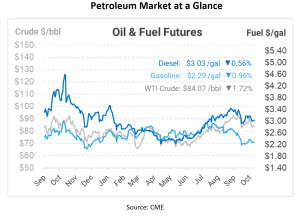
3 Mistakes to Avoid When Buying Fuel
When it comes to buying fuel in bulk, making mistakes can result in considerable financial losses.
Whether you are a construction company, government entity, fleet operator, or any other type of business that needs to buy bulk fuel, it’s important to get your fuel buying right. In today’s article, we will dive into three common mistakes to avoid when buying fuel.
- Focusing on Price Instead of Cost
Fuel commodity sales can be incredibly competitive, with purchasing decisions coming down to tenths of a penny per gallon. And that makes sense – when you’re buying millions of gallons, those fractions of a cent can add up.
Many fuel buyers focus so much on getting the cheapest price that they forget about other important factors. For instance, they might choose a supplier solely based on price but sacrifice reliability: running out of fuel can be much more expensive than saving a few cents per gallon. They might also spend lots of time and effort dealing with invoices from many different suppliers when using just one could be much simpler and more efficient.
Plus, many businesses miss out on money-saving opportunities like tax credits. So, when managing a fuel program, remember that it’s not just about the price; there are many other things to consider.
- Ignoring Your Fuel Data
Many transportation companies are sitting on a trove of data that can inform their operations. Fuel demand can be a leading indicator of R&M costs, customer demand, and more. When buying fuel, it is crucial to understand your data.
If your fuel data is scattered across multiple suppliers and disparate web portals, you’re missing out on a comprehensive view of your business. Whether your company buys fuel at gas stations or in bulk, paying attention to fuel data can help you make better decisions and run your business more efficiently.
- Not having a backup supply option
The last few years have made clear that a fuel market emergency can happen anywhere. From wildfires on the West Coast to pipeline outages in the East, fuel markets have had a bumpy few years. When markets are calm, it’s easy for fleets to become complacent – but it’s always important to have a backup plan. When your local fuel terminal or pipeline shuts down, how will you get fuel?
Talk to your supplier about their backup options. Some suppliers have built-in redundancy in nearby markets to ensure reliability during emergencies. If your supplier is limited to a single supply source, it may be time to contact another supplier to be a “warm backup” during emergency events.
Now you can avoid procurement pitfalls with Mansfield Energy
In fuel procurement, knowledge is your ally. By avoiding these three mistakes we mentioned above – you can make better decisions that save you money and prevent unnecessary stress.
If you are looking for a reliable partner for fuel purchasing, talk to Mansfield Energy. With decades of experience, Mansfield has the capability to ship via major pipelines and has a strong presence in U.S. terminals. To find out more, get in touch with us today!

This article is part of Daily Market News & Insights
Tagged:
MARKET CONDITION REPORT - DISCLAIMER
The information contained herein is derived from sources believed to be reliable; however, this information is not guaranteed as to its accuracy or completeness. Furthermore, no responsibility is assumed for use of this material and no express or implied warranties or guarantees are made. This material and any view or comment expressed herein are provided for informational purposes only and should not be construed in any way as an inducement or recommendation to buy or sell products, commodity futures or options contracts.





